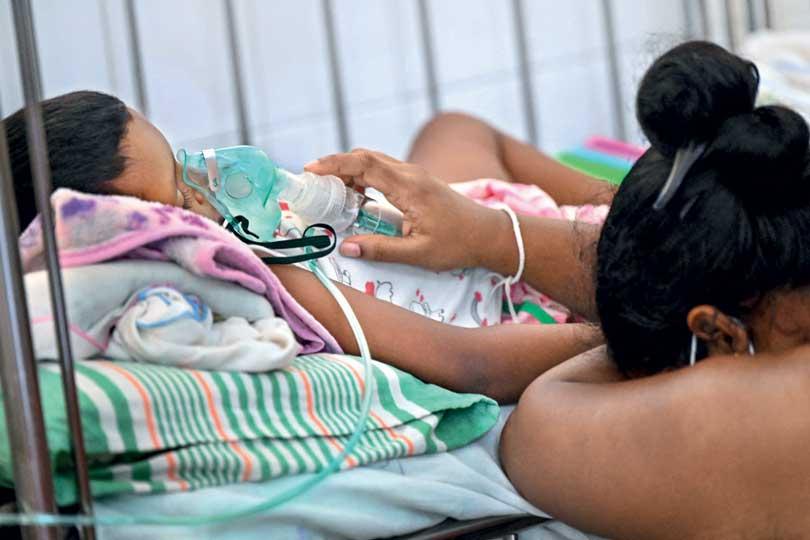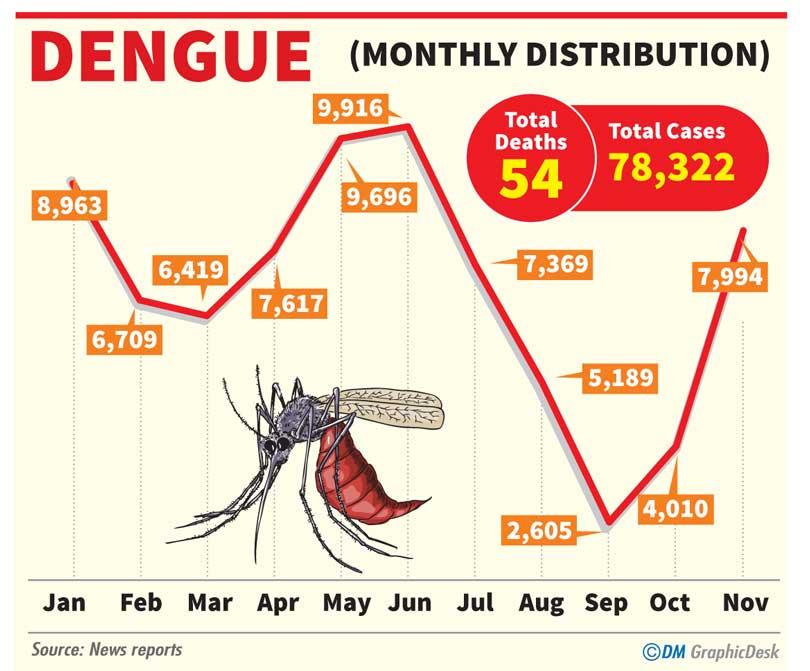07 Dec 2023 - {{hitsCtrl.values.hits}}

According to medical experts the main reasons for deaths associated with dengue is the delayed presentation to hospital and use of various types of strong medicines to combat fever

 Dengue is a viral infection that spreads through mosquitoes to people and is prevalent during the North East monsoon period. Dengue mosquitoes prefer to breed in clean, stagnant water. As a result, during this period, the irresponsible ways of disposing waste could lead to the collection and stagnation of water; simultaneously fostering a favourable environment for dengue mosquitoes to breed. Therefore, identifying and eradicating potential breeding spots indefinitely helps reduce the rise of dengue mosquitoes, affirm health care professionals. Meanwhile medical professionals have warned that delayed presentation to hospital and use of various types of strong medicines to combat fever have put patients into a category which spells doom.
Dengue is a viral infection that spreads through mosquitoes to people and is prevalent during the North East monsoon period. Dengue mosquitoes prefer to breed in clean, stagnant water. As a result, during this period, the irresponsible ways of disposing waste could lead to the collection and stagnation of water; simultaneously fostering a favourable environment for dengue mosquitoes to breed. Therefore, identifying and eradicating potential breeding spots indefinitely helps reduce the rise of dengue mosquitoes, affirm health care professionals. Meanwhile medical professionals have warned that delayed presentation to hospital and use of various types of strong medicines to combat fever have put patients into a category which spells doom.
At present the highest number of dengue cases has been reported from the Western Province paved by the Colombo District. A few other increasing cases of Dengue are reported from the districts of Gampaha, Kandy, Kalutara, Puttalam, Galle, Kegalle, Badulla, Ratnapura, Kurunegala, Batticaloa, Trincomalee and Jaffna.
Dr. Sashini Ranaweera, a medical officer attached to the National Dengue Control Unit, said, “We have had 78,022 patients in total for the whole year and just for these 5 days we the number of patients was 1534. During November, we had 7995 patients compared to October where we had 4010; which is considerably a lesser amount of patients,” she said. Ranaweera further said, “We had 46 dengue deaths this year. And one of the main reasons for deaths is the delayed presentation to hospital and use of various types of strong medicines to combat fever. As a result, patients fall under the category called NSAIDs, which is harmful when dealing with dengue”.
The most pivotal determinants to this sharp increase in dengue cases are critiqued to be due to; 1. Geographical inequality – high population density in certain districts and unplanned urbanization design 2. Improper solid waste management 3. Human risk behaviour – storage of water in barrels/tanks without closing them, ornamental water containing items, domestic tube wells, roof gutters etc. and 4. The indefinite weather patterns.
As a result, The National Dengue Control Unit is keen on overcoming these root causes.With the help of the Medical Officers of Health accessing the areas that are at high risk through the dengue surveillance systems while further conducting evidence-based entomological surveys, special mosquito control programmes, health promotion activities, community awareness programmes, clean-up (Shramadhana) campaigns in schools and the use larvicides to destroy the mosquito larvae all part of the effort taken to control the spread of dengue.
“We visit places and advise people to segregate and dispose of waste in a responsible manner and to avoid keeping spaces where water may collect. Healthcare professionals can help and guide people by spreading awareness of the dangers of dengue mosquitoes. However, it is up to the people to put the programme into action by cleaning up spaces and reducing favourable spots for the dengue mosquitoes to breed in” explained Ranaweera.
These campaigns and programmes mainly introduce ‘source reduction.’ Source reduction activities are designed to reduce the toxicity of products throughout the life cycle. As a result, these campaigns and programmes advice people to engage in regular clean ups, specifically in areas where the possibility of the collection of water and improper disposal of garbage may pave way for the breeding of Dengue.
07 Jan 2025 6 hours ago
07 Jan 2025 7 hours ago
07 Jan 2025 8 hours ago
07 Jan 2025 07 Jan 2025
07 Jan 2025 07 Jan 2025